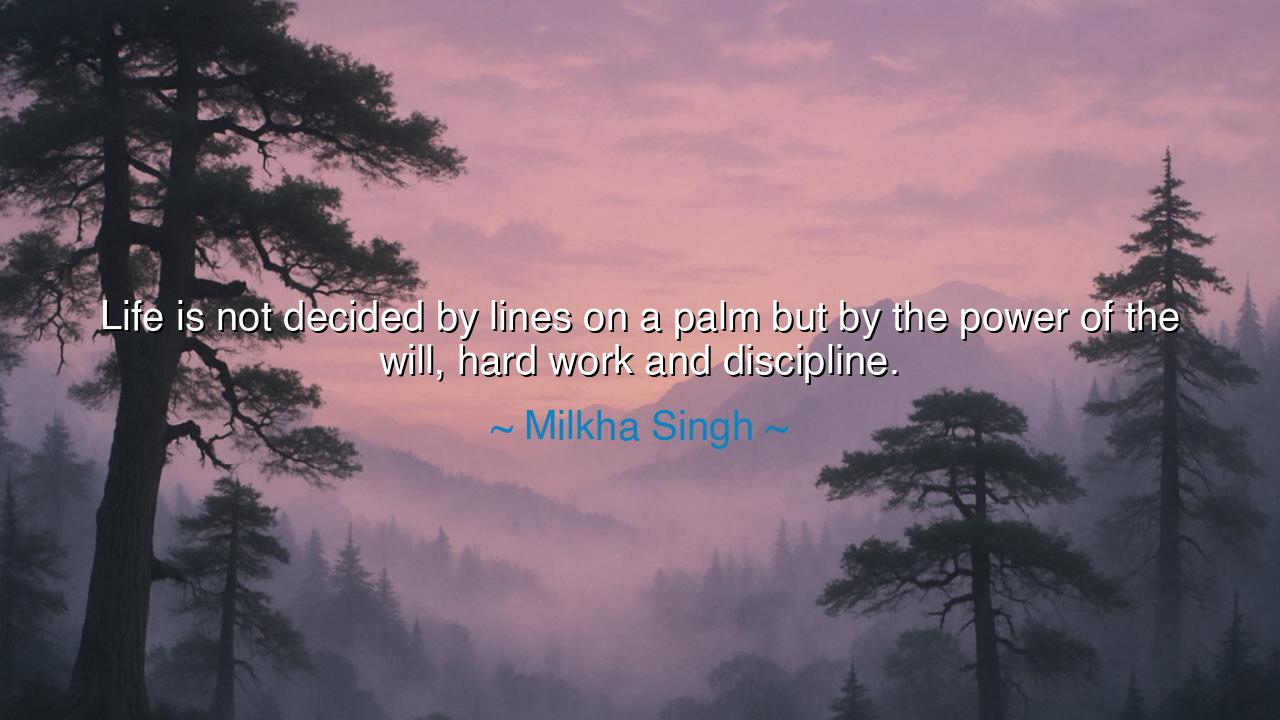
Life is not decided by lines on a palm but by the power of the
Life is not decided by lines on a palm but by the power of the will, hard work and discipline.






“Life is not decided by lines on a palm but by the power of the will, hard work, and discipline.” These words from the great Milkha Singh strike to the heart of an ancient truth — that life is not shaped by fate or the stars, nor by the signs found in the palm of a hand, but by the strength of the human will and the effort we put into forging our own path. The ancient Greeks understood this well. Heraclitus, a philosopher of profound insight, spoke of life as a river in constant flow, where change is inevitable, but it is the individual's actions, guided by will and discipline, that determine whether they thrive or sink. Destiny is not some fixed course, but a series of decisions, each influenced by our ability to focus, to strive, and to persevere.
In the stories of the ancients, the idea of fate was often seen as a force to be challenged. Achilles, the great hero of the Iliad, was told of his inevitable death at Troy, yet it was not the certainty of his fate that defined him, but his choices in battle, his will to become the greatest warrior, and the discipline he showed on the field. Similarly, Milkha Singh, who rose from the devastation of personal tragedy and national adversity, exemplified this very principle. From the untold hardships of his youth, Singh did not look to the lines on his palm or the whims of fate. Instead, he transformed his destiny through relentless hard work, willpower, and unyielding discipline in the sport of athletics, carving out a place for himself among the world's greats.
Singh’s journey is a living testament to the truth that we are the architects of our own fate. Born into poverty and faced with the horrors of partition, where he witnessed the death of his family, he could have been consumed by grief and despair. But instead, he turned his pain into power, using his will to drive him through grueling training and countless obstacles. Singh became the Flying Sikh, setting records and conquering international tracks not through luck, but through unrelenting effort and focus. His life proves that the key to success is not found in the hand of fate, but in the strength of one's resolve.
Throughout history, the most revered figures — whether they were warriors, poets, or leaders — understood the value of discipline in shaping their destinies. Mahatma Gandhi, though not a warrior by sword, shaped a nation with the power of his will and discipline. He did not wait for fate to free India from colonial rule; he worked tirelessly, leading through nonviolence, showing the world that personal discipline and collective action can move mountains. It was the unwavering strength of his will and his ability to inspire discipline in his followers that brought about one of the most significant changes in modern history.
Thus, Milkha Singh’s words echo the wisdom of the ancients, urging us to look beyond the illusions of fate and the uncertain lines of our palms. Our power lies not in the forces outside of us, but in the choices we make and the dedication we show to our goals. Hard work, discipline, and a resolute will are the true architects of success, and it is through them that we carve our paths, no matter the challenges that lay before us. The future is not dictated by what is written on our hands, but by what we choose to write in our hearts.
May we take these words to heart and live with the understanding that our fate is not sealed, but is shaped by our hands, by the power of our will, and the discipline we carry within. It is through these qualities that we can overcome any adversity, rise to any challenge, and carve out our own place in the world.






H115 Nguyen Trung Hieu 12A2
I’m curious about the psychological dimension here. How much of willpower and discipline is innate, and how much can be cultivated through training and environment? Are there methods to strengthen mental resilience and sustain effort in the face of repeated failure? I’d like perspectives on strategies to harness determination effectively while avoiding burnout or frustration.
DAbui dinh duc anh
This quote raises a concern about societal beliefs in luck or predestination. Could reliance on fate limit ambition or accountability? How do we teach young people to focus on actionable effort rather than waiting for external signs of success? I’d like to explore examples where disciplined persistence transformed ordinary circumstances into extraordinary achievements.
TPthao phuong
I find myself questioning the balance between hard work and talent. Can consistent effort truly outweigh natural aptitude, or is it a combination that yields results? How do we maintain motivation when progress is slow or obstacles seem insurmountable? I’d love perspectives on how athletes, artists, and professionals sustain both discipline and willpower to achieve long-term success.
GDGold D.dragon
I feel inspired but also challenged by this idea. It raises the question of whether motivation alone is sufficient without strategy and guidance. How can we develop the kind of discipline and resilience required to achieve meaningful goals? Are there practical frameworks or daily habits that help translate willpower into measurable progress in both personal and professional endeavors?
NMPham Ngoc Mai
This makes me reflect on the role of personal effort versus fate. While many people believe in destiny or signs, this perspective emphasizes control through discipline and willpower. Can anyone truly overcome circumstances through sheer determination, or are there limits imposed by environment, resources, or social conditions? I’d like to explore how much of success is internal drive versus external opportunity, and how they interact in real life.